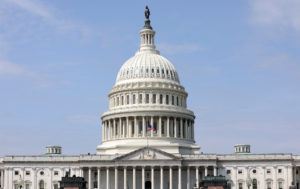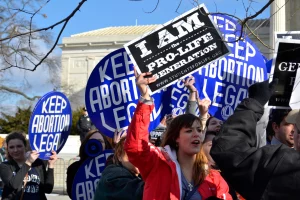
WASHINGTON (BP)–Pro-family advocates received mixed results from the United States Supreme Court on two cases the justices recently refused to take up.
The high court announced May 15 it would not review a lower-court ruling that upheld a federal anti-obscenity law against a challenge by an Internet, hard-core pornography business. The justices declined, however, to consider a decision that enabled a lesbian to seek parental rights to a daughter of a former partner.
In declining to review the obscenity decision, the Supreme Court delivered a victory to foes of the spread of sexually graphic material. In October, the Third Circuit Court of Appeals overturned a federal judge’s dismissal of an indictment against Extreme Associates Inc., a Los Angeles-based business. A grand jury had indicted Extreme Associates, which acknowledged its online material is legally obscene, with conspiracy to distribute obscenity and disseminating obscene material through the mail and the Internet.
A three-judge panel of the Third Circuit, which is based in Philadelphia, ruled that Supreme Court precedent supported federal anti-obscenity laws against First Amendment and due process challenges. The federal court erred in ruling the anti-obscenity measures violate privacy rights, the Third Circuit panel said.
“By calling it ‘Extreme,’ they aren’t product-puffing,” said Jan LaRue, Concerned Women for America’s chief counsel, in a written statement. “This is some of the most vile and disgusting porn available anywhere. The fact that this garbage is accessible to kids makes the offense all the more egregious. Thankfully, the courts have rejected this ridiculous challenge to the federal law.”
In dismissing the indictment at Extreme Associates’ request in a western Pennsylvania federal court, judge Gary Lancaster had referenced a 2003 U.S. Supreme Court opinion overturning state prohibitions on homosexual sodomy. The Lawrence v. Texas decision, Lancaster wrote, “can be reasonably interpreted as holding that public morality is not a legitimate state interest sufficient to justify infringing on adult, private, consensual, sexual conduct even if that conduct is deemed offensive to the general public’s sense of morality.”
The Department of Justice urged the Third Circuit to review the January 2005 opinion and overturn it. If Lancaster’s decision was upheld, DOJ said it was concerned the ruling “would undermine not only the federal obscenity laws, but all laws based on shared views of public morality, such as laws against prostitution, bestiality and bigamy.”
Meanwhile, in a case from Washington state, the high court refused to review a decision by that state’s Supreme Court granting a victory for homosexual, parental rights.
Sue Ellen Carvin and Page Britain were in a same-sex relationship when they decided to have a child by artificial insemination. Britain gave birth in 1995 to a girl, and the two women reared her until breaking up in 2001. Britain then became engaged to and ultimately married the child’s biological father, John Auseth, who had lived with both women and provided financial support after Britain became pregnant. In 2002, Britain refused to permit Carvin to visit the girl.
In November, the Washington Supreme Court ruled in a 7-2 decision Carvin could seek rights as a “de facto parent” in a lower court.
“Though we wish the Supreme Court would have heard this case, the justices must not have thought it was the appropriate vehicle to examine the legal issues involved,” said Chris Stovall, senior legal counsel for the Alliance Defense Fund, in a written release. “But activists for the homosexual agenda keep pushing this ‘psychological parenting’ contention in state courts across the country, so we know eventually the Supreme Court will address this issue.”
ADF lawyers have represented Britain in the case.
–30–















